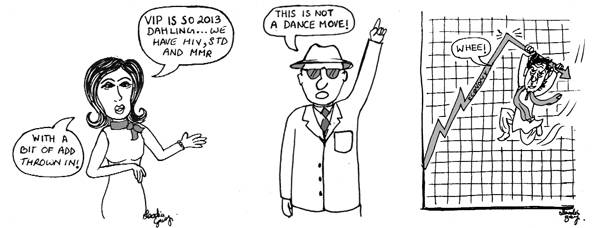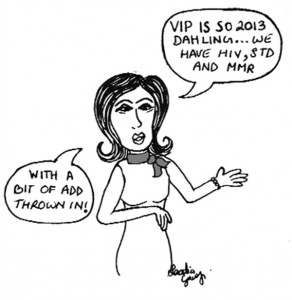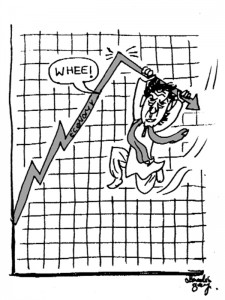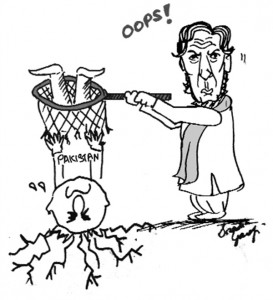
Silver lining
Sir,
South Asia is vulnerable to climate change and resulting disasters due to increasing economic activities and growth rate and rising demand for energy. Pakistan and India both suffered colossal losses in the recent floods. I look at it as a God-sent opportunity for both the countries.
This is the opportune moment for both nations to turn a threat into opportunity by relaxing travel across the line of partition to facilitate relief and rescue work. This will serve as an assurance to the common man of both the countries that they are not being treated as mere pawns in the respective politico-military armories of the warring neighbours. Time is ripe for both the countries to collaborate & partner a stable cooperation with regards to disaster management. Both New Delhi & Islamabad can help each other, one through its Economic Size & the other through its fertile Human Resource in mitigating disaster by setting up an efficient information sharing and early-warning mechanism to counter all natural catastrophes together. Let this incident become a catalyst for the rise of a new dawn in Indo-Pak relations and may peace prevail throughout South Asia.
Some see glass half empty. I see glass half full!
Afzal Rahim,
Islamabad.
People and power – I

Sir,
The incident of ‘off-loading’ of two parliamentarians at Karachi airport has triggered a debate on VIP culture in Pakistan.
VIP culture is an effect of elite model of governance and politics in the country. Pakistani political elite set socio-cultural values based on the idea of perpetuating their rule and declaring themselves above law. The nexus between political elites and bureaucracy is a tragic part of Pakistan’s national history. Ever since the days of Ghulam Muhammad, the nation has paid a heavy price in the shape of the ever growing trend of VIP mindset.
Incidents like Karachi may cause some ripples but should not be mistakenly interpreted as a big change. Strengthening and independence of state institutions is the only way to curb the menace of VIP culture. There are islands of exemplary functioning of state institutions like Pakistan Motorway Police where law treats everyone alike.
Pakistani society has come a long way from being relatively egalitarian in the 50s and 60s to increasingly elitist. When law is not implemented, a power vacuum is created which consequently gets filled by elites. Political parties of the set political order are thriving on VIP culture. Political parties that otherwise are formed to empower common people and solve their problems are themselves indulging in VIP culture and promoting party interests at the cost of rule of law.
The role of the leadership is very important in an elite model. Leaders lead by example. If the leader obeys the law, the followers does the same. The greatest example of that in recent history is George Washington, who could have continued as president but set a great example by stepping down after two terms in office and made the institution of president strong. Nelson Mandela is another example of submitting to law and consequently killing the spirit of VIP culture. Political leadership in Pakistan draws its strength from elections, yet is disconnected with the plight of the masses. Frustration is building against the oppression of the ruling elites and custodians of the status quo. Our leader must play their due role before things go towards anarchy.
Atif Mahmood Majoka,
Melbourne.
People and power – II

Sir,
Everybody in Pakistan is talking these days about change, accountability and rule of law, while the media have selectively launched a campaign against VIP culture. Yet in this country, a poor girl gets raped by three sons of an MNA in Faisalabad, and police fails to pursue the case just because the influential parliamentarian succeeds in silencing the parents of this unfortunate rape survivor. Have we forgotten the fate of Dr Shazia Khalid, who was raped in Baluchistan, and instead of getting justice she had to flee the country?
Murderers of young Shahzeb and Hamza managed to circumvent law in Karachi, because their parents could bribe their way through. Almost every day, scores of innocent human beings, including policemen, are brutally murdered on the streets of Karachi, yet nobody gets caught.
A PIA Captain and his copilot are caught smuggling electronic gadgets and instead of facing criminal proceedings, they are let go because the captain is a younger brother of an influential person and the president of the union. Had this man been in Emirates he would have been sacked.
It is an established fact that the fish rots from head down, and so does any society. If the writ of law is to prevail, the civil and uniformed bureaucracy including politicians and traders must be punished for violation of law.
For democracy to succeed in Pakistan, all that is needed is for the men in power to submit to laws and pay all taxes. Those holding public offices must be judged on higher moral and ethical standards than common citizens, because they decide the fate of this country. What this country needs is more democracy and accountability, not dictatorship or any supra-constitutional intervention.
Nighat Malik,
Dubai.
People and power – III

Sir,
Many moons ago I read in one of our dailies that there were more VIPs than HIVs in Pakistan. If the VIPs were told that that HIV was a higher status than VIP, they would cry out, “We are positive!”
Ali Akbar,
Karachi.
Time to go home

Sir,
The current political situation of Pakistan is giving Pakistan a bad name. Criticism pours in as the international community denounces such unconstitutional political ploys to hijack the legally elected political regime in the country. The US Ambassador in Pakistan has had official and informal meetings with different political and religious leaders over and has shown concern over the raising chances of anarchy. Pakistan is being termed a ‘mess’, where both the leaders of the protest namely Imran Khan and Dr Tahirul Qadri’s activities are taken as nothing but part of a “shameless power grab”.
Britain supports continuation of democracy in Pakistan and has pressed upon the fact that ongoing political crisis should be resolved democratically. British Secretary of State for Foreign and Commonwealth Affairs Phillipe Hammond further urged political parties to resolve their political differences using democratic institutions. Which in these circumstances is the best possible solution and as I see it, the only one that can actually achieve concrete outcome.
The European Union too has shown a deep concern on current political situation of Pakistan saying, “We are deeply concerned by the current situation in Pakistan and are monitoring events closely. We reiterate our conviction that the current impasse should be resolved peacefully through dialogue within the framework of the constitution and we urge all parties to act responsibly and to refrain from using violence.” Further, the European Union’s statement hinted that Pakistan has failed to reap the benefits of the GSP Plus Status yet, whereas the prevailing political crisis may lead the country to wash its hands of the advantages in case of any political setback. It is obvious that Pakistan will lose its one of the biggest achievement of the decade due to the non seriousness of political parties.
It must be noted here that textile exporters in particular have expressed serious concerns lately that the ongoing dharnas in the federal capital are compromising their capacity to meet with their clients who have begun to look at competing countries to fill their orders. Once a client is lost then it is extremely difficult to get him back. In this context, there is an urgent need for the government, PTI and PAT to reach an agreement and end the dharnas as soon as possible. It is inappropriate to celebrate the one month sit-ins as announced by the PTI leadership. It is being felt by most people that the sit-ins have stretched on too far too long and that life is being compromised. Most people are against the unconstitutional tactics of protest. This displays how a small number of people are hijacking not only the capital, but the economy as well.
According to Washington Post, “an extensive new survey of public sentiment in Pakistan reveals that the ongoing demonstrations are hardly reflective of the views of most Pakistanis.” Further, the annual Pew Research Center survey of Pakistan finds that 64 percent of residents have a favorable view of Sharif, a solid rating that has essentially remained constant since Sharif’s returned to power last year. About four in ten residents now have confidence in Pakistan’s economy, compared to just 17 percent who felt that way last year. Moreover, Pew notes that 36 percent of residents are optimistic that the economy will improve over the next year, twice as many who felt that way compared to last year.
Pakistan-China friendship has always been of great significance to Pakistan. Both countries are working to take up some huge economic projects, like the construction of the Lahore-Karachi Motorway and two power plants at Port Qasim. Also, China terms Pakistan as its largest investment destination in South Asia and will remain so in the years to come. However, these relations were also on the verge of disaster as the postponement of the Chinese prime minister will cost the nation in both economic gains and time.
The Chinese leader has expressed that we need to “work together to foil those attempts which are aimed at harming our relationship,” According to him, diplomatic channels and officials of the two countries had done a lot of preparation for a positive and concrete outcome to the visit. The Chinese hope that the expected fruits and outcome will be achieved in spite of the visit’s postponement is something that goes in our favor, however it may not be the same in case of other countries. How far are we going to stretch our luck in issues of key significance? Surely this insanity must end to pave way for progress and peace. The dire need is felt to join hands and move in one direction that goes towards prosperity.
Amna Malik,
Islamabad.
The way out

Sir,
It has now been more than five weeks since the two revolutionaries are sitting in outside the parliament in Islamabad. One demands a complete change in the system, which he thinks is not in compliance with the 1973 constitution. He heads a political party which does not have any seat in parliament and thus is being called a “non-entity” by the rulers. The other, who has over two dozen seats in the National Assembly and Khyber Pakhtunlhwa government, is is alleging a large-scale rigging in the May 2013 general elections and hence claims that people in the parliament are not true public representatives and the assemblies are bogus. He has several demands, the first being the resignation of the prime minister, as under him no inquiry could be free and fair. The government and other parties of the opposition are not ready to accept his first demand and have passed a resolution to this effect.
There have been several rounds of dialogue by negotiating teams and jirgas, but to no avail. Although all political parties agree that there has been rigging in the last elections, they do not want fresh elections.
The solution to this crisis is to find or form a neutral entity who should determine the extent of rigging and decide whether there should be re-elections or if the present set-up should continue.
Muhammad Azhar Khwaja,
Lahore.
Death by Melodrama

Sir,
Coincidence obviously that the US Ambassador (the 4th Umpire?) visited our Army Chief and the ISPR sprang into action with, “Army is not linked to the ongoing political activity.” Taken at face value this is most reassuring. But, with the utter freedom of speech (and almost everything else) across the country it takes a large bag of salt to swallow that assurance given that since the early 50’s this one institution has, overtly and behind the scenes, been the main reason for Pakistan’s existence. Rightly or wrongly, that is precisely the reason it is called the 3rd Umpire!
That said, can anybody explain why this dharna continues? On the plus side is the following: barring NS’s resignation the IK-TuQ front has achieved much of its objective of getting governance changes it rightly demanded. In the process, the ‘sacrosanct supremacy’ of Parliament has been shattered and its divinely ordained members are beginning to be insulted, rejected and seeing their ‘privileges’ erode. Irrespective of what further happens Nawaz Sharif is already a lame duck for the rest of his term- if he lasts it out. Most importantly, as the attacks on VIP Culture have shown, ordinary citizens have tasted people power and sensed the winds of change. We can only hope this will be for the better.
On the negative side: Pakistan already was an anarchic state waiting to happen. Years of misrule by the military and the civilian leaders bred by them for the desired purpose of the day have brought us here. Public frustration and anger, already at bursting point, is ready to explode. Can the burning of electricity bills, urging people to not pay taxes, use Havala and to destroy the little remaining infrastructure of the country just to prove some point actually be of benefit? Not only are we a near bankrupt economy, the socio-economic disruption caused by this prolonged dharna and the inopportune catastrophic floods have further set us back another few years. This is already a nation settling personal scores through mayhem and fratricide. Is the IK-TuQ formula that we hear and see going to improve that?
If the sole objective of this exercise is to remove the prime minister and all the rest of the wastrels in and out of Parliament and install the IK-TuQ team as the best thing since ice-cream, could our umpires please get on with it and let us get on with the way we always have in our 67 years of periodic Naya Pakistans instead of this slow death by idiotic melodrama?
Dr Mervyn Hosein,
Karachi.

